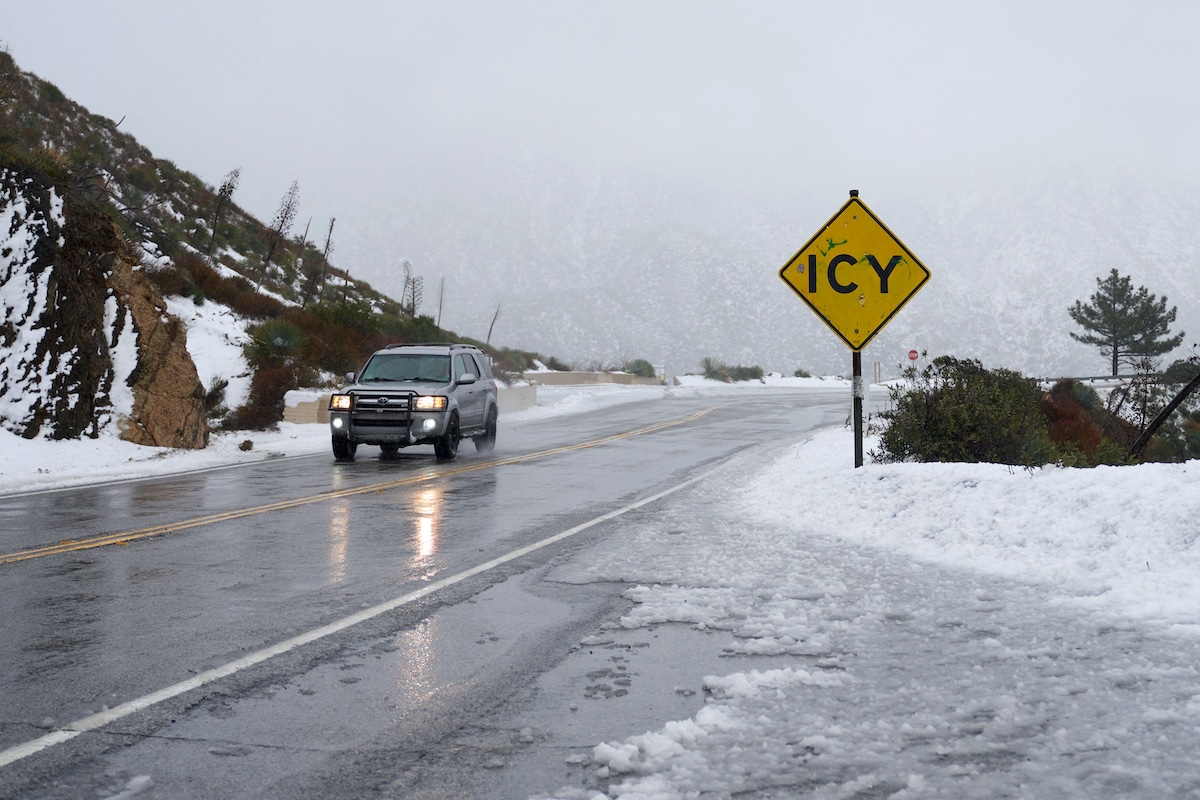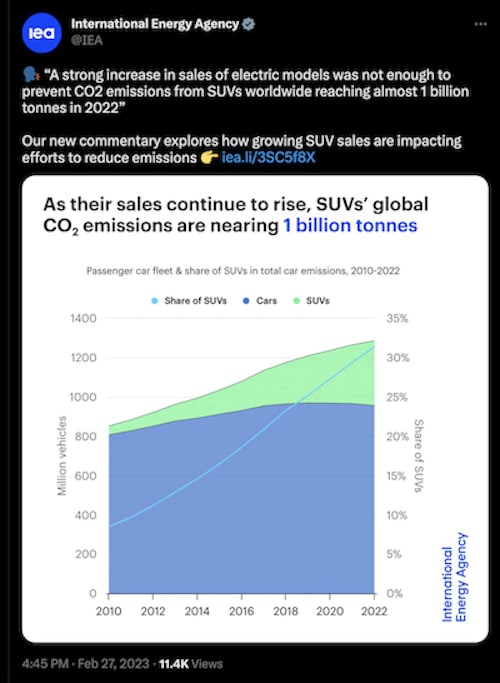How Bad Are SUVs for the Climate?

 Why you can trust us
Why you can trust us
Founded in 2005 as an Ohio-based environmental newspaper, EcoWatch is a digital platform dedicated to publishing quality, science-based content on environmental issues, causes, and solutions.
SUVs are often seen as the symbol of excessive fossil fuel consumption, but how bad are they really for the climate?
Very, it turns out. New data from the International Energy Agency (IEA) released last week found that the carbon dioxide emissions from SUVs rose by nearly 70 million tonnes in 2022 to reach a yearly total of nearly one billion tonnes. If SUV drivers comprised their own nation, they would be the sixth-most emitting country in the world, The Guardian pointed out.
“Electric SUVs are growing in popularity, but not quickly enough to offset the increasing oil consumption and emissions of the wider fleet,” the IEA wrote.

The report’s findings aren’t notable simply for pointing out that SUVs emit a lot — in the U.S., they emit around 14 percent more carbon dioxide on average than a small passenger vehicle, as The Guardian reported in 2020, and consume around 20 percent more oil than the average midsize car, according to the IEA. Rather, the findings are notable because, of all conventional car sales in 2022, SUV sales are the only ones that went up. While total car sales fell by 0.5 percent, SUV sales went up by around three percent, representing 46 percent of total car sales to reach 330 million on the road.
“Global car markets did not have a good year in 2022, but SUVs were an exception, raising further concerns about their impact on efforts to tackle climate change,” the report authors wrote.
While the oil demand of conventional cars plateaued between 2021 and 2022, for SUVs it went up by 500,000 barrels a day, guzzling a third of the growth in oil demand for the year.
One climate positive from the report was that sales of electric vehicles (EVs) were the other exception, rising by 60 percent with more than 10 million cars sold for the first time. This included sales of electric SUVs, which now account for 16 percent of total SUV sales and 55 percent of total EV sales.
However, electric SUVs are not an ideal solution from an environmental perspective.
“SUVs require larger batteries to power them, so a growing electric SUV market would impose additional pressure on battery supply chains and further increase demand for the critical minerals needed to make the batteries,” the IEA wrote.
The agency recommended reducing the size of the average car as well as innovations such as battery swapping and new technologies. However, the car market is currently moving in the opposite direction, senior director for vehicles and e-mobility at Transport & Environment Julia Poliscanova told CNN.
“Carmakers are culling small cars in pursuit of profit,” Poliscanova said. “But larger cars put more pressure on the planet as they need more materials and energy. For drivers, this means more expensive models and higher running costs, especially at a time of high energy prices. Ultimately, Western carmakers might come to regret this.”
Some, like economic historian and degrowth expert Matthias Schmelzer, have called for an outright ban on non-essential SUVs. He pointed to a recent Financial Times article finding that SUVs and light trucks now made up four fifths of U.S. car new sales when they represented only one fifth half a century ago. In addition to putting pressure on the climate and essential raw materials, larger cars also increase the risk of road accidents.

The group Tyre Extinguishers takes its SUV opposition to the streets by deflating the tires of the large vehicles. The night the IEA report was released, they deflated hundreds of tires in Europe, The Guardian reported. On Tuesday, they deflated a further 60 tires in Brussels for the first action in the city, according to their website. To date, they have deflated more than 10,000 SUVs in 16 countries.

“SUVs and 4x4s are a disaster for our health, our public safety and our climate. Bigger and bigger cars are dominating our towns and cities, and all so a privileged few can flaunt their wealth. Because governments and politicians have failed to protect us from this danger, we must protect ourselves,” the group explains on its website.
Subscribe to get exclusive updates in our daily newsletter!
By signing up, you agree to the Terms of Use and Privacy Policy & to receive electronic communications from EcoWatch Media Group, which may include marketing promotions, advertisements and sponsored content.

 233k
233k  41k
41k  Subscribe
Subscribe 




